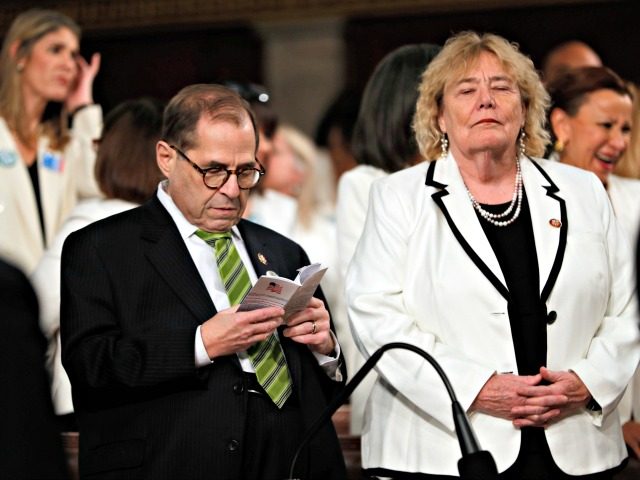President Trump announced that he would be implementing a temporary pause on certain types of immigration to help the United States recover from COVID-19. And it only took about 14 hours for his detractors to accuse him of exceeding his authority and violating the separation of powers.
New York Attorney General (AG) Letitia James threatened to sue, in order to protect Congress’ power to “write immigration policy.” And Jerrold Nadler and Zoe Lofgren claimed, “Under our Constitution, Congress writes the laws, and the president must enforce them as written. This executive order turns that bedrock principle of separation of powers on its head.”
The problem here is that AG James, and both Representatives Nadler and Lofgren, appear to have less working knowledge of the Constitution they are sworn to uphold than the average seventh grader in a French middle school. And it turns out that President Trump is, in fact, faithfully enforcing the law, as written by Congress.
As all three of the aforementioned civic illiterates should be well aware, 8 U.S.C. § 1182(f) grants the President of the United States broad power to, “suspend the entry of all aliens or any class of aliens as immigrants or nonimmigrants, or impose on the entry of aliens any restrictions he may deem to be appropriate.” This power may be exercised, “Whenever the President finds that the entry of any aliens or of any class of aliens into the United States would be detrimental to the interests of the United States.” And the president is specifically permitted to take such action, “by proclamation, and for such period as he shall deem necessary.”
Only two years ago, the Supreme Court of the United States (SCOTUS) addressed the powers granted to the president to manage immigration when America’s interests are at stake during a time of crisis. In Trump v. Hawaii, the SCOTUS ruled firmly in favor of the Trump administration. And the court noted that, “By its terms, §1182(f) exudes deference to the President in every clause. It entrusts to the President the decisions whether and when to suspend entry, whose entry to suspend, for how long, and on what conditions. It thus vests the President with ‘ample power’ to impose entry restrictions in addition to those elsewhere enumerated in the INA.”
In plain English, that means the following: Congress specifically granted the president authority to impose additional restrictions on immigration – above and beyond those already found in the Immigration and Nationality Act – in times of crisis, when the president deems U.S. interests to be at stake. And, quite frankly, it’s hard to envision a more explicit authorization for a temporary immigration pause during a global pandemic.
AG James should be well aware of this decision. In November of 2017, the State of New York filed a friend of the court brief encouraging the SCOTUS to rule against the Trump administration. Her side lost. And any responsible practitioner of the law would have read up on exactly why, so as to avoid misleading the public, or any tribunal, as to the state of the law – which is an offense that may lead to disbarment. (Under the American Bar Association’s Model Rules of Professional Conduct, which serve as the basis for most states’ laws governing the practice of law, “Legal argument based on a knowingly false representation of law constitutes dishonesty toward the tribunal.”)
Representatives Nadler and Lofgren should also be aware of Trump v. Hawaii. The legislative body of which they are members specifically delegated the authority contained in Section 1182(f) to the president. Of course, they remained silent when every chief executive prior to President Trump took action pursuant to Section 1182(f). Accordingly, their real concern seems to be their personal dislike for one Donald J. Trump, not any legitimate concern for the integrity of our constitution or its separation of powers doctrine.
So, what’s really going on here? At first glance, it would simply appear to be a case of the losing party in a public policy struggle whining to the press. That’s hardly unique in American politics. However, in this case, the gangrene runs much, much deeper.
The comments from AG James, Representative Nadler and Representative Lofgren are a shocking example of three prominent, government officials deliberately refusing to accept a duly and properly rendered decision by the nation’s highest court. And they have rejected the Trump v. Hawaii ruling not because of any inherent legal flaw. Instead, they refuse to accept it simply because it stands in the way of their political agenda. It’s a case of politicos throwing a tantrum because the SCOTUS correctly applied the law, the way it was written, and according to established constitutional doctrine, not the way the James/Nadler/Lofgren political ideology would dictate. If that isn’t a violation of the separation of powers, I have no idea what is.
Now, the open borders lobby will attempt to undermine Trump v. Hawaii by attrition, filing baseless lawsuits against the new immigration pause in sympathetic districts – the politico-legal version of throwing manure at a wall and hoping some eventually sticks. And all Americans who value the rule of law and constitutional federalism should be asking themselves one important question: Is this how American democracy dies, not with a bang, but with an open borders whimper?
Matt O’Brien is director of research at the Federation for American Immigration Reform(FAIR), a nonprofit group advocating for legal immigration. Prior to working for FAIR, he spent many years as a trial attorney with U.S. Immigration and Customs Enforcement.

COMMENTS
Please let us know if you're having issues with commenting.